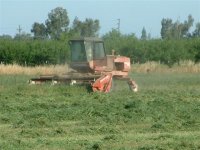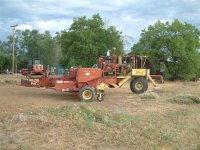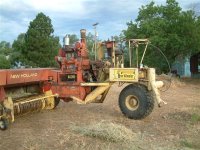I'm a life long farmer, almost 45 years on my own. I have degrees in soil and crop science, as well as having spent more than 15 years on an advisory board @ Univ of Ky School of Agriculture where we lend advice to young upstarts in the farming industry (who have completed studies @ Univ of Ky)
FIRST THOUGHT.....Get LOCALIZED advice. So far, you've received advice on what specifics "you" should consider in Illinois from a Canadian, Up state New Yorker, Californian, ect......I'm FAR closer that any of them, being in central Kentucky, and MY opinions on how to operate a farm probably/possibly have little to do with what works in YOUR neighborhood.
Contact your state/county extension agents, local Universities, and even farmers in your area. THEIR opinions will actually have some bearing on what works and what doesn't in your area. Not that you should discount the advice shared here, as much of this advice is coming from successful farmers in their own right. Just take it with a grain of salt. It's all about what works in your immediate locale.
You ARE in a part of the country where no-till not only works, but is being proven year after year to out yield (at a much lower cost) than conventional crops SO LONG AS IT'S DONE CORRECTLY. In my area, no-till beans comprise more than 90% of what's grown here, and corn is above 75% no-till, with numbers rising every year. Where no till works, profits are well above conventional in MOST cases in a good year, and by the nature of no-till farming, losses are far less in bad years. It's just a safe, practical way of doing business IF it fits your area.
And my PERSONAL advice....With no more "hands on experience" than you have in grain farming, I'd consider looking to rent/lease your farm to a local farmer with the stipulation that YOU will have an active roll in the selection of inputs, the process of applying them, the monitoring of crops throughout the growing season, harvesting, sales, even "closing the books" on the year. Let them know you're wanting to essentially "co-op" with them as a learning process. I'm "small potatoes" now compared to most modern farms, but I've still managed to find room for 2 "apprentice" helpers. They provide me with young, capable labor, and I'll HOPEFULLY teach them a few tricks of the trade.
It's also my opinion that the WORST time to buy into ANY aspect of farming is when times are GOOD. Prices are high and margins are tight with todays prices. When commodity prices drop, you can be left holding the proverbial bag on a bunch of over priced equipment and inputs. IMHO, best time to BUY is when everyone else is hurting and in need of a "bail out". Buy low, sell high.....Farming is the only industry I know of where you pay retail when buying and sell at wholesale.....


